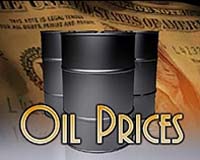 |
Houston, Texas (AFP) May 3, 2010 US officials Monday unveiled the creation of a board to review offshore drilling safety and tighten oversight of oil equipment testing as a giant slick spread over the Gulf of Mexico. "We must continue to do everything we can to oversee and support BP's efforts to stop and clean up the oil that is spilling from the well head," said Interior Secretary Ken Salazar. "At the same time, we must take aggressive action to verify the safety of other offshore oil and gas operations, further tighten our oversight of industry's practices, and take a careful look at all the questions that this disaster is raising." He was speaking during a visit to command centers in Houma and Robert, Louisiana, where he announced the establishment of the Outer Continental Shelf Safety Board in the wake of the April 22 accident on the Deepwater Horizon rig. An estimated 210,000 gallons of crude a day has been streaming from the wellhead below the rig leased by BP, threatening the US Gulf coast with an environmental catastrophe. The region boasts 40 percent of US wetlands -- prime spawning waters for fish, shrimp and crabs and a major stop for migratory birds. Many analysts welcomed Monday's announcement of the oversight board, as the administration moves to lift a ban on offshore drilling in many parts of the Atlantic Ocean and Gulf of Mexico in place since the early 1980s. "It's better to establish a regulatory board than do nothing," said Jack Plunkett, chief executive officer of Plunkett Research in Houston, Texas. "Otherwise, you might see marches on Washington, DC to cut off offshore drilling entirely. It's happened before." The new board's first task will be to oversee the investigations into the Deepwater Horizon accident by the federal Minerals Management Service and US Coast Guard, Salazar said. It will also make recommendations to President Barack Obama on further safety measures and technologies to prevent future incidents. Plunkett likened the move to a Federal Aviation Administration investigation of an airplane accident. "What they are saying is let's look into it and make recommendations not let's pull all aircraft out of the air," he said. The move comes 11 days after the explosion that destroyed Deepwater Horizon, an offshore oilrig owned by Transocean Ltd, which BP commissioned to drill an exploratory well. Eleven oil workers missing since the blast are feared dead. The new board will also weigh the results of inspections underway of all 30 deepwater drilling rigs and 47 deepwater production platforms in the Gulf of Mexico, which Salazar ordered last week. The targeted inspections will investigate whether tests of the blowout preventer -- a triple stack of safety valves -- among other safety mechanisms have been completed. The valves known as a BOP are supposed to cut off the flow of oil and gas when they detect unsafe levels of pressure. Results of the inspections are expected within three weeks. Industry analyst John Olson, managing partner of the hedge fund, Houston Energy Partners, said the cause of the accident was probably mechanical failure or human error rather than drilling apparatus inadequately designed to withstand with the high temperatures and pressure of the deepwater environment. "The two likely culprits are the BOP, which have had many documented failures," he said. "Or it could have been improper cementing of the well." But Plunkett warned the true cause of the disaster might never be determined. "You have to wonder whether there is enough of a record left after the explosion to make a determination," he said. "And the people mostly likely to know what was going on that day are probably the ones that died." According to Transocean, Halliburton, a Houston-based oil services company, had just finished cementing the well shortly before the explosion. Cementing is the process whereby oil and natural gas are preventing from escaping by sealing the rig's well pipe to the core bored beneath the ocean floor. If not done properly, an explosion can occur.
Share This Article With Planet Earth
Related Links Powering The World in the 21st Century at Energy-Daily.com
 Oil mixed, sticks around 86 dollars
Oil mixed, sticks around 86 dollarsSingapore (AFP) May 3, 2010 Oil was mixed in Asian trade Monday, shedding initial gains made after Europe's endorsement of a massive aid deal for Greece and expectations of a US supply drop caused by a giant oil slick, analysts said. New York's main contract, light sweet crude for June, edged down six cents to 86.12 dollars per barrel. Brent North Sea crude for June delivery was up nine cents to 87.53 dollars a bar ... read more |
|
| The content herein, unless otherwise known to be public domain, are Copyright 1995-2010 - SpaceDaily. AFP and UPI Wire Stories are copyright Agence France-Presse and United Press International. ESA Portal Reports are copyright European Space Agency. All NASA sourced material is public domain. Additional copyrights may apply in whole or part to other bona fide parties. Advertising does not imply endorsement,agreement or approval of any opinions, statements or information provided by SpaceDaily on any Web page published or hosted by SpaceDaily. Privacy Statement |